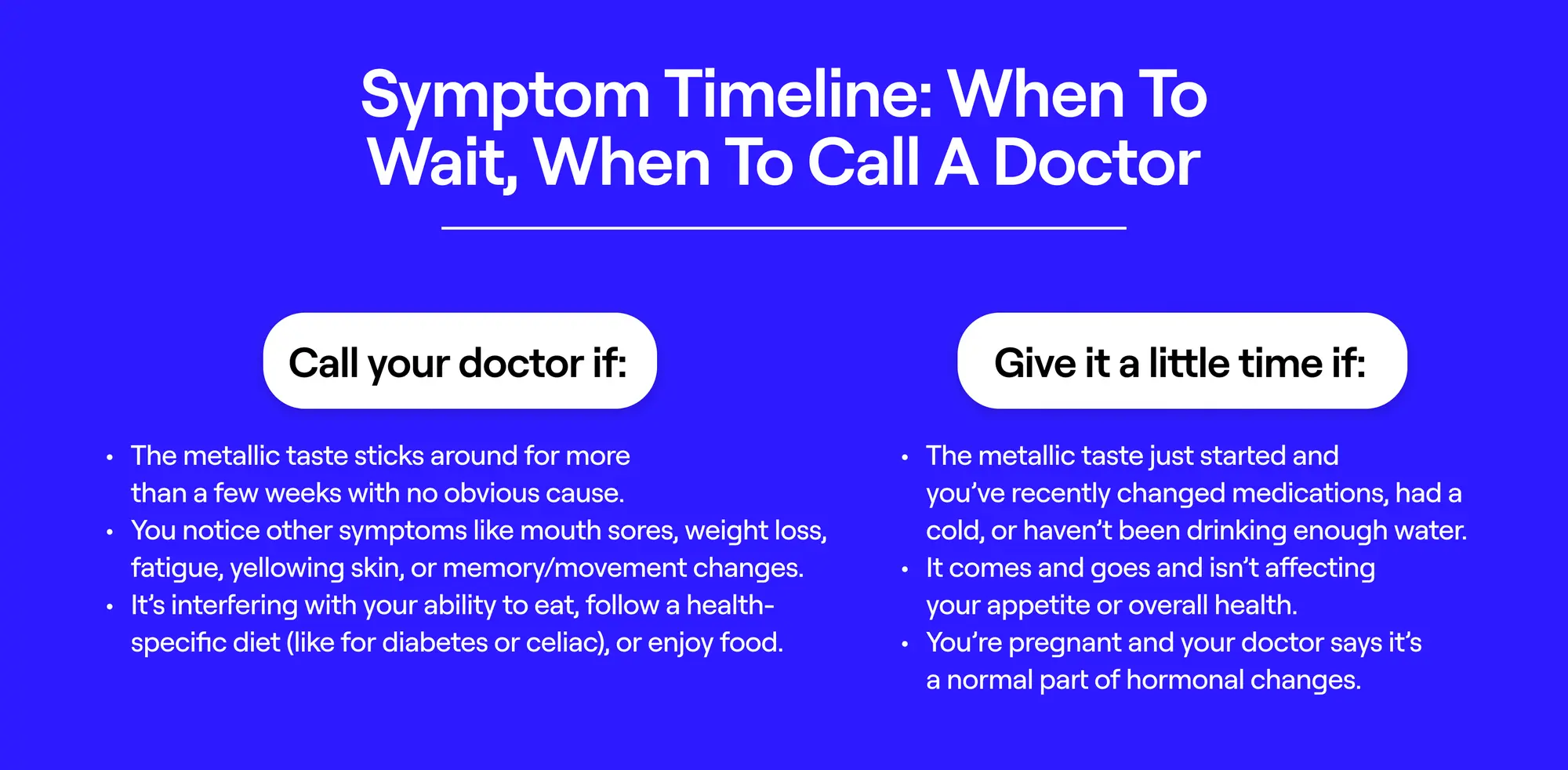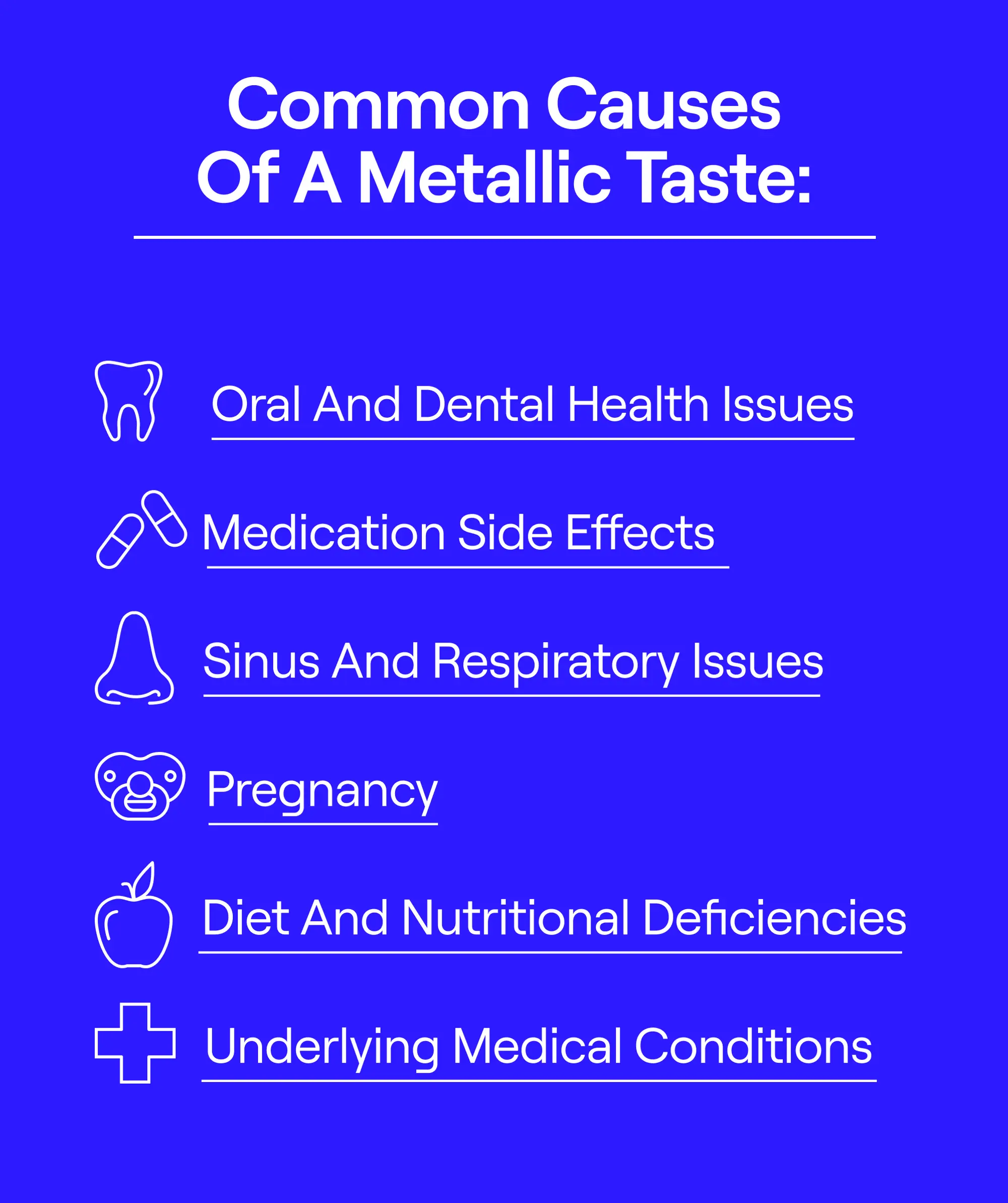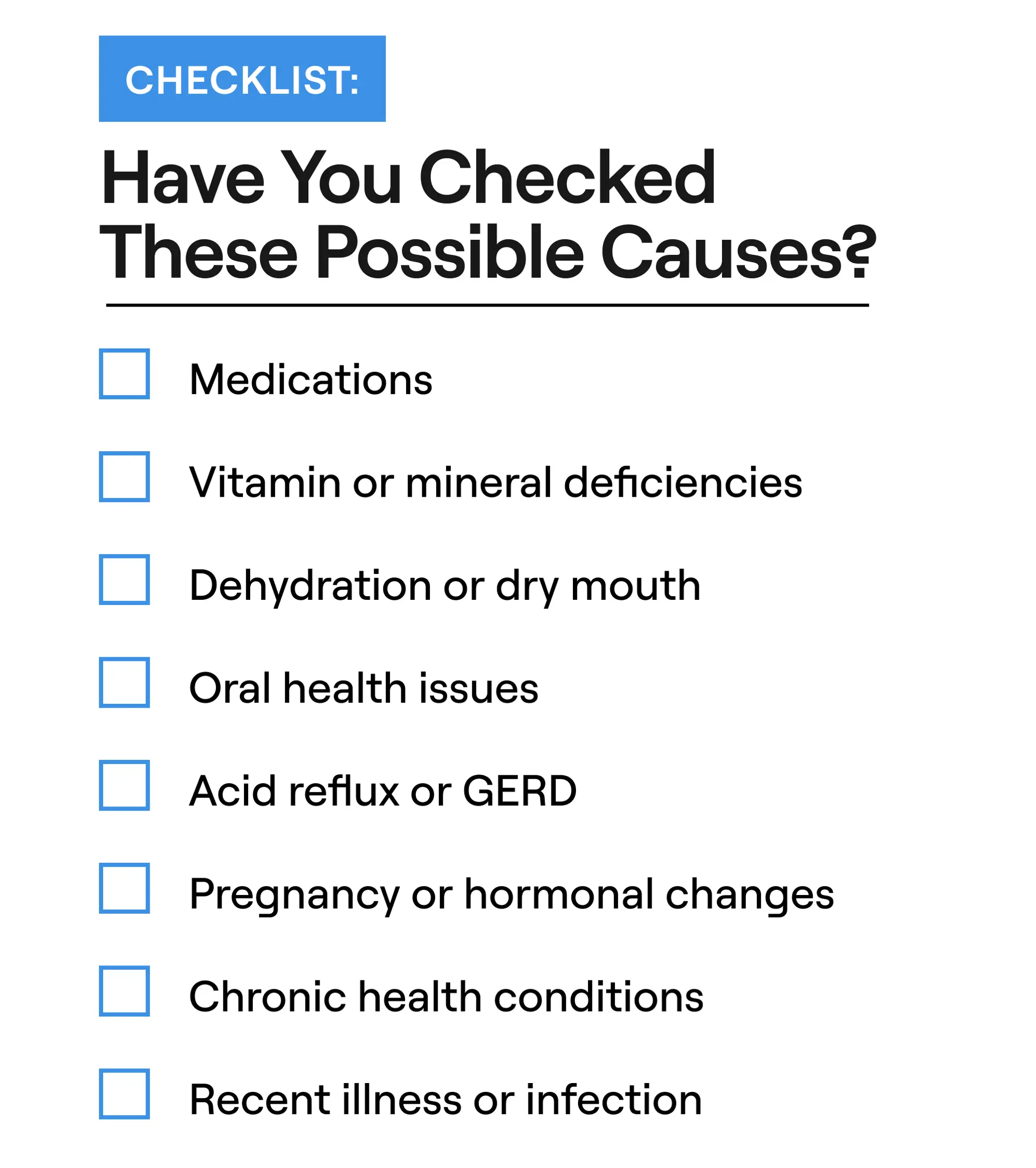
Jump to
Book a visit
$25 typical copay
$100 without insurance
Get expert care for your taste changes today.
That weird or sudden metallic taste in your mouth? It’s more common than you might think—and often fixable once you find the cause.
Ever had a metallic taste in your mouth that made even plain water taste weird? I have—and let me tell you, it was unsettling. When I was pregnant, suddenly everything I ate or drank had a harsh, metal-tinged aftertaste. I brought it up with my doctor, who reassured me it was a totally normal (and thankfully temporary) side effect of pregnancy hormones.
But pregnancy is just one of many reasons your mouth might start tasting like you’ve been sucking on a penny. The truth is, a weird taste in your mouth—especially a metal one—happens surprisingly often. “A metallic taste in the mouth (dysgeusia) is fairly common, even though many people don’t mention it to their doctor,” says Adam Carewe, MD.

Symptom Timeline
And while the causes range from totally harmless habits (like dehydration or poor oral hygiene) to more serious health conditions (like nutrient deficiencies or liver problems), the good news is that it’s often treatable once you know what’s behind it.
So if you’ve ever found yourself Googling, “why does my mouth taste like metal?”—you’re in the right place. Let’s break down what could be going on and how to get that weird taste out of your mouth for good.
What does a metallic taste mean?
The medical term for that lingering metal taste in the mouth is dysgeusia, a condition that alters your sense of taste. Sometimes, it makes everything taste metallic, like you’ve been chewing on a handful of spare change. Other times, food might seem unusually sour, bitter, or even rotten. Not exactly appetizing.
So, what’s behind this weird taste in mouth? Taste isn’t just about your tongue. Your ability to taste relies on a complex system involving your taste buds (especially those little bumps called papillae), saliva quality and flow, the lining of your mouth, multiple cranial nerves, and even your brain’s chemical messengers (neurotransmitters). If anything in that system is out of whack—whether due to dryness, nerve damage, inflammation, or other changes—your taste perception can shift. And that’s when the metallic flavor hits.
Common Causes of a Metallic Taste
There are plenty of reasons you might wake up with a sudden metallic taste in your mouth—some are common and harmless, while others are rarer and linked to underlying health issues. Let’s take a look:

Common Causes Of A Metallic Taste
Oral and dental health issues
Often, the root cause of a metallic taste—aka “metal mouth”—starts right where the taste buds live: your mouth. A range of oral and dental issues can disturb your sense of taste.
Infections
Bacterial, viral, or fungal infections in your teeth, gums, mouth, or throat can cause inflammation, block blood flow to taste buds, or trigger chemicals that change how things taste. Translation? Your mouth could end up tasting funky—sometimes bitter or metallic.
Dry mouth
Saliva isn’t just there to keep your mouth moist. It helps dissolve food so it can actually hit your taste receptors. Without enough spit, flavors can fall flat or taste strange. In fact, dry mouth (aka xerostomia) affects nearly 1 in 4 people worldwide, making it a surprisingly common cause of that metallic taste, Dr. Carewe says.
Dental hardware
Dentures, crowns, fillings, and other dental materials (like acrylic) can sometimes affect your sense of taste. Some people are more sensitive to these materials than others, and that sensitivity can come with a metallic aftertaste.
Burning mouth syndrome
This condition causes a burning feeling in the mouth, often paired with unpleasant taste changes like bitterness or metallic flavors. Researchers think the metallic edge might be linked to nerve dysfunction.
Bleeding gums
Gum disease can impact taste receptors, and if your gums bleed, the iron in your blood can leave behind a coppery, metallic flavor. Not exactly minty fresh.
Poor oral hygiene
Slacking on brushing and flossing? Poor oral hygiene ramps up your risk of infections and gum disease—two major culprits behind metallic taste. So yes, skipping floss can come back to bite you … in the tongue.
Medication side effects
If your mouth tastes like metal, your pillbox could be the problem. Believe it or not, a metallic taste is a super common side effect of medication—more than half of all prescription drugs in the U.S. can modify your sense of taste in one way or another.
This can happen through several mechanisms, including:
- Reduced saliva production
- Damage to taste receptors
- Interference with taste-related nerves
- Changes in neurotransmitter function
While any medication might cause taste changes, some drug classes are more notorious than others. Common culprits include:
- Blood pressure and heart medicines
- Antibiotics like amoxicillin, clarithromycin, and metronidazole
- Antihistamines
- Diuretics
- Chemotherapy agents
- Certain anti-inflammatory drugs
- Immunosuppressants
- Neurologic medications
- Psychiatric drugs, including some antidepressants
Not every drug in each category will affect taste, and not every person will notice changes. If you suspect your medication is messing with your mouth, don’t stop taking it without talking to your provider. They might be able to switch you to an alternative or suggest ways to manage the side effect.
Sinus and respiratory issues
Altered taste (and smell) is super common when you're sick with allergies, cold, or the flu. Why? All that nasal congestion and mucus build-up can block your senses. Swollen nasal tissues and changes in mucus composition can temporarily change (or shut down) your ability to smell and taste.
But it’s not just about a stuffy nose. Viral infections can also trigger inflammation in your actual taste buds. This inflammation interferes with how taste cells regenerate and function, leading to that dulled or metallic flavor.
In fact, more than 200 viruses can cause upper respiratory infections that interfere with taste and smell, including rhinoviruses (common cold), influenza, COVID, and even hepatitis viruses.
For most people, it’s a short-term thing. Taste usually bounces back once the infection clears. But in some cases, especially after a viral illness, people experience long-lasting taste issues—either a total loss or a reduced ability to detect flavors. These changes might come on suddenly or creep in over time.
Take COVID, for instance. A 2024 study of one hundred post-COVID-19 patients found that 34 percent experienced dysgeusia, and among those with distorted taste, over 55 percent reported metallic taste.
Pregnancy
During pregnancy, you might be prepared to deal with morning sickness, but a sudden metallic taste in your mouth? Probably not what you expected while expecting (I certainly wasn’t). But taste changes, especially a metallic one, are quite common in pregnancy. So common, there’s even a name for it: pregnancy dysgeusia.
Like morning sickness (and all the other less pleasant pregnancy symptoms), blame it on the hormones. Hormonal fluctuations can actually affect the way you perceive taste. Fortunately, your taste buds won’t be weird forever. They usually recover once you enter the second trimester when your hormones start to even out.
But hormones aren’t the only possible cause of metal mouth during pregnancy. Some prenatal vitamins, especially those with iron, can meddle with your mouth too. “Iron (iron salts) can react with your mouth in a way that creates this strange flavor,” Dr. Carewe says. “Some vitamins may also contain tiny amounts of other metals (trace heavy metals) that could add to the taste.” Though the metal taste is not fun, rest assured, “these levels are usually safe,” he adds.

Diet and nutritional deficiencies
What you eat—and how much of certain nutrients you’re getting—can affect how things taste. A metallic or off taste could be your body's way of waving a nutritional red flag. Both nutrient deficiencies and excesses can throw off your sense of taste. Here are some of the most common dietary and nutrient-related causes of “metal mouth”:
Vitamin B12
Your body needs vitamin B12 to make red blood cells, support your nerves, and help with DNA production. But if you’re running low, your taste buds might pay the price. B12 deficiency can lead to a swollen, inflamed tongue, sometimes closing off taste pores and dulling your sense of taste. Symptoms might sneak up gradually or hit you fast, depending on how your body absorbs it. Since we can’t produce B12 naturally, deficiency is fairly common, especially in older adults or those with absorption issues.
Zinc
Zinc is involved in tons of essential processes, including how we process taste. A zinc deficiency can disrupt taste transduction (fancy talk for how your brain reads flavor signals), and has been directly linked to taste disorders.
Iron
If you’ve ever popped an iron supplement and noticed a gross metallic aftertaste, you’re not imagining it. Iron—especially in supplement form—can react with your mouth and leave behind that weird flavor. While a little iron is essential, too much can overwhelm your system and affect taste perception. In severe cases (like iron overdose), the metallic taste may be a sign of toxicity and should be taken seriously.
Other dietary factors
Some foods themselves can spark bizarre taste changes. One odd example: Pine Nut Syndrome (PNS). After eating certain types of pine nuts (mainly Pinus armandii), some people experience a bitter, metallic taste that kicks in 12 to 48 hours later, lingering for up to four weeks. The exact cause isn’t fully understood, but it might be linked to genetics, particularly among people with a heightened sensitivity to bitter flavors.
Underlying medical conditions
Distorted taste can be tied to a wide range of medical conditions. Some causes are common (like reflux or dry mouth), while others are rarer and more complex (think nerve damage or autoimmune disease). The underlying mechanisms vary, but they all have one thing in common: they can throw your sense of taste way off. Here are some of the top health-related reasons behind that weird metallic flavor:
Autoimmune disorders
Conditions like Sjogren’s syndrome, autoimmune encephalitis, myasthenia gravis, and lupus can all interfere with taste. These diseases often cause problems like inflammation or dry mouth (from reduced saliva), both of which can dull your ability to taste or make flavors seem off.
Neurological disorders
Neurologic disorders like multiple sclerosis, Alzheimer’s, and Parkinson’s have all been linked to dysgeusia. Because these conditions affect the central nervous system, they can disrupt how your brain interprets taste signals from your mouth.
Metabolism disorders
Chronic conditions like kidney disease, liver disease, diabetes, and hypothyroidism can all hamper your sense of taste and alter how your taste buds function.
Nerve damage
The nerves that control taste are delicate and complex. Trauma or surgery to the neck, head, or mouth can damage cranial nerves or taste buds directly. Even brain injuries, like contusions or hemorrhages, can lead to taste dysfunction.
Acid reflux or GERD
If you’ve got acid reflux or GERD, stomach acid and digestive enzymes can rise up into the mouth and interfere with how taste buds work, leaving a strange taste in your mouth.
When to see a doctor
“Most of the time, a metallic taste isn’t serious and goes away on its own,” Dr. Carewe says. It’s often caused by things like medications, mouth infections, or vitamin deficiencies. But if that weird flavor lingers or you notice other changes in your health, don’t brush it off.
You shouldn’t have to live with an unpleasant taste in your mouth, especially since it can impact your mental and physical health. When food stops tasting good, people often eat less, avoid certain foods, or drop entire food groups. Over time, that can lead to poor nutrition, weight loss, and even anxiety and depression.
For some, taste changes are particularly risky. If you have a condition like diabetes, celiac disease, or high blood pressure, a distorted sense of taste can make sticking to a medical diet even harder. When healthy food starts tasting off, the temptation to ditch it for something else grows, and that can have serious consequences for your heart, metabolism, and overall health.
So, when should you see a doctor for a weird taste in your mouth? “If the metallic taste lasts more than a few weeks or comes with other symptoms like mouth sores (oral lesions), weight loss, yellowing of the skin (jaundice), or changes in thinking or movement (neurologic changes), you should see a healthcare provider,” Dr. Carewe says. In rare cases, taste changes can signal more serious conditions, like kidney disease or neurological issues. A medical professional like those you can access virtually at General Medicine can help assess what’s going on, rule out anything serious, and guide you toward treatment that brings your taste buds back to normal.
Symptom Timeline: When to Wait, When to Call a Doctor
Give it a little time if:
- The metallic taste just started, and you’ve recently changed medications, had a cold, or haven’t been drinking enough water.
- It comes and goes and isn’t affecting your appetite or overall health.
- You’re pregnant and your doctor says it’s a normal part of hormonal changes.
Call your doctor if:
- The metallic taste sticks around for more than a few weeks with no obvious cause.
- You notice other symptoms like mouth sores, weight loss, fatigue, yellowing skin, or memory/movement changes.
- It’s interfering with your ability to eat, follow a health-specific diet (like for diabetes or celiac), or enjoy food.
How to get rid of metallic taste in mouth
Effective home remedies and lifestyle changes
If the funky flavor in your mouth is bugging you, some simple at-home fixes can make a big difference. Lifestyle tweaks and good oral hygiene are often your first (and best) line of defense when you’re wondering how to get rid of metallic taste in your mouth.
Level up your oral hygiene
Keeping your mouth clean helps reduce bacteria that might be causing or worsening the taste issue. Try this:
- Brush at least twice a day and floss daily.
- Use an antibacterial mouthwash to keep plaque at bay.
- Scrape your tongue twice a day to remove bacteria and dead cells.
- See your dentist regularly for cleanings and checkups.
Stay hydrated
Dry mouth is a major cause of taste problems. Often, the antidote to metal mouth can be as simple as drinking water throughout the day (non-caffeinated drinks count, too). You can also suck on ice chips or sugar-free popsicles to keep your mouth moist. If you have dry mouth from medications or radiation therapy, artificial saliva sprays or salivary stimulants can keep your mouth hydrated and help restore some normal taste too.
Ditch the metalware
It may sound strange, but your utensils might be making things worse. Regularly using metal forks or spoons can contribute to a metallic taste. Swap them for bamboo, plastic, ceramic, or wooden utensils.
Make taste-friendly tweaks to your diet
What you eat can help neutralize that metallic tang:
- Eat a nutrient-rich diet with fruits, veggies, whole grains, and lean protein to avoid vitamin and mineral deficiencies, which can lead to distorted taste.
- Skip super spicy, heavily sauced, or processed foods. They might amp up the metallic flavor.
- Citrus fruits, pickles, or anything vinegar-based can help disguise the taste. A splash of lemon or orange juice can work wonders.
Rinse your mouth before meals
Swish with water and a bit of salt or baking soda prior to eating. It may help neutralize acids and improve your mouth’s pH balance, possibly reducing the tinny taste.
Chew gum
Yes, really. Sugar-free gum between meals can boost saliva, which helps wash away unpleasant tastes and prevent dry mouth.
Quit smoking
Tobacco muddles with your taste buds in more ways than one. It can coat your tongue, dry out your mouth, trigger infections, and change how flavors register. If you’re dealing with persistent metallic taste and you smoke, quitting could be a game-changer.
Professional treatments and approaches
If that metallic taste in your mouth sticks around for more than a few weeks—or shows up alongside other symptoms—home remedies may not be enough to resolve it. Sometimes, a deeper health issue is the real culprit, and getting to the bottom of it may require medical help.
When it comes to treating metal mouth, “the best approach is to treat the root cause,” says Dr. Carewe. Because there are so many possible triggers for dysgeusia, the right fix depends on what’s actually going on in your body. Here are a few examples of how treatment might look:
- Vitamin or mineral deficiencies? Taking the right supplements—like B12 or zinc—can make a big difference.
- Medication to blame? Ask your doctor if switching to an alternative drug is possible. Important: Never stop taking a prescribed medication without talking to your healthcare provider first.
- Managing a chronic condition? If diabetes, thyroid issues, or kidney disease are in play, getting them under control could help your taste buds bounce back.
- Oral health problems? If gum disease or dental issues are the source, regular cleanings and evaluations from your dentist might be the solution.
Key takeaways
- A metallic taste in your mouth (aka dysgeusia) is usually harmless and often caused by medications, nutrient imbalances, infections, or oral health issues.
- Common causes include certain antibiotics, vitamin B12 or zinc deficiency, and respiratory viruses like the cold or flu.
- Taste changes—especially if they stick around—can affect your appetite, nutrition, and even mental health.
- Simple fixes like better oral hygiene, staying hydrated, or tweaking your diet can help ease symptoms.
- If the taste lingers for more than a few weeks or comes with other symptoms, check in with your doctor—it could signal a more serious issue.
General Medicine follows a strict editorial process, including using real experts to write our articles, vetted primary sources, fact-checking, a secondary medical review, and updates as necessary. This article was medically reviewed and fact checked by Pallabi Sanyal-Dey, MD, and Poushali Bhattacharjee, MD.
The bottom line
A metallic taste in your mouth might be annoying, but it’s not something you have to grin and bear. While it’s often caused by something simple (like a new medication or dehydration), it can also be a sign of an underlying health issue, especially if it stays around or comes with other symptoms.
If you’re dealing with a persistent or unexplained metallic taste, don’t ignore it. Getting checked out by a healthcare provider can give you peace of mind and help you feel like yourself again.
If you’re looking for fast, trustworthy answers, make an appointment with one of General Medicine’s online healthcare providers. You’ll get expert advice and convenient treatment options without leaving home. Chances are, it’s something that can be easily managed—but if it’s more serious, our providers will make sure you get the care and guidance you need to tackle the issue head-on.
Checklist: Have You Checked These Possible Causes?
- Medications – Are you taking antibiotics, antihistamines, blood pressure meds, or antidepressants? Some drugs can mess with your taste buds.
- Vitamin or mineral deficiencies – Low on zinc or vitamin B12? Deficiencies can trigger that metal mouth feeling.
- Dehydration or dry mouth – Not drinking enough water? Dry mouth can distort taste, especially if you’re on certain meds or breathing through your mouth.
- Oral health issues – When was your last dental checkup? Gum disease, infections, or poor oral hygiene might be the culprit.
- Acid reflux or GERD – Got heartburn or a sour taste? Stomach acid could be affecting your taste buds.
- Pregnancy or hormonal changes – Hormones can totally throw off your sense of taste.
- Chronic health conditions – Conditions like diabetes, liver or kidney disease, or hypothyroidism can all distort your sense of taste.
- Recent illness or infection – Sinus infections, colds, and even COVID-19 have been linked to changes in taste.
FAQ
What does a metallic taste in your mouth indicate?
A metallic taste in your mouth usually means something’s off with how your taste system is working. It could be as simple as a side effect from medication, a vitamin or mineral deficiency, or a sign of dry mouth. Sometimes, it’s linked to things like infections, acid reflux, or even hormonal changes. Most of the time, it’s not serious and goes away on its own, but if it persists or comes with other symptoms, it’s worth checking in with your doctor to rule out anything more serious.
Can liver problems cause metallic taste in the mouth?
Yes, they can—especially in more serious liver conditions like cirrhosis (i.e., scarring of the liver). “When your liver isn’t working well, it can affect how you taste things,” explains Dr. Carewe. This metallic taste often stems from low levels of key nutrients like zinc and magnesium, or from chemical changes in your body and brain caused by liver dysfunction, he says.
What deficiency causes metal taste in mouth?
A metal taste in your mouth can sometimes be a sign you're low on certain nutrients—especially vitamin B12 or zinc. These nutrients play important roles in taste perception and overall oral health. If you're not getting enough, it can throw off your taste buds and leave you with that weird, metallic flavor. A simple blood test can help pinpoint any deficiencies, and treating them often helps get your taste back on track.
When should I worry about a weird taste in my mouth?
A weird taste in your mouth—like a metallic, sour, or bitter flavor—usually isn’t a big deal and often clears up on its own. But if it lasts longer than a few weeks, or comes with other symptoms like mouth sores, weight loss, yellowing skin, or changes in your thinking or movement, it’s time to check in with a doctor. Sometimes, a persistent strange taste can signal an underlying health issue, so it’s worth getting it looked at just to be safe.
Our editorial standards
At General Medicine, we cut through the clutter to make health care clearer, faster, and easier to navigate. Every article is grounded in evidence-based research and peer-reviewed journals, reviewed by medical professionals, and written in accessible language that helps you make health decisions with confidence. We’re committed to ensuring the quality and trustworthiness of our content and editorial process by providing information that is up-to-date, accurate, and actually useful. For more details on our editorial process, see here.

